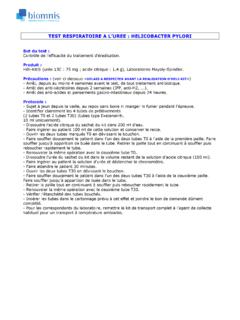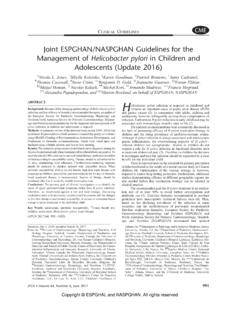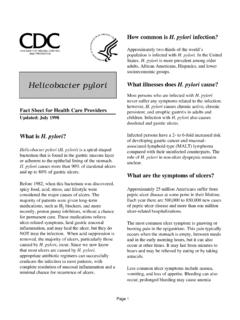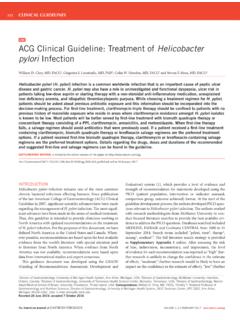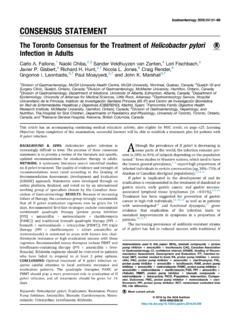Transcription of Guidelines for the Management of Helicobacter …
1 H- pylori Guidelines for the Management of Helicobacter pylori Infection a report by P e t e r M a l f e r t h e i n e r 1 , F r a n c i s M g r a u d 2 and C o l m O ' M o r a i n 3. 1 Department of Gastroenterology, Hepatology and Infectious Diseases, Otto-von-Guericke University Magdeburg; 2 INSERM ERI-10, Laboratoire de Bact riologie, Universit Victor Segalen Bordeaux 2;. 3 Adelaide and Meath Hospital Introduction was recommended in adult patients below 45 years of Dr Peter Malfertheiner is Professor of Gastroenterology at Otto-von- age the age cut-off may vary locally presenting in Guericke University Magdeburg and The European Helicobacter pylori Study Group primary care with persistent dyspepsia having Director of the Department of (EHSG) was founded in 1987 to promote multi- excluded those with predominantly gastro- Gastroenterology, Hepatology and Infectious Diseases.
2 Previously, he disciplinary research into the pathogenesis of oesophageal reflux disease (GORD), non-steroidal was Professor of Medicine at the Helicobacter (H.) pylori . Since then, the EHSG has anti-inflammatory drugs (NSAIDs) consumption and University in Bonn. Dr Malfertheiner's organised successful annual meetings and arranged those with alarm symptoms. This recommendation research interests include Helicobacter (H.) pylori infection, main clinical task forces on paediatric issues and clinical trials on has been vindicated in more recent publications. The outcomes, such as peptic ulcer H. pylori . Consensus meetings have convened on definition of low prevalence is a population with an disease and gastric cancer, gastro- oesophageal reflux disease and who, how and when to treat patients with H.
3 pylori infection rate of less than 20%. pancreatic pathology. Research infection. The most active area of research is the link includes studies on basic mechanisms of H. pylori with gastric cancer, a major public health The Cochrane Systematic Review stated that the test- and clinical trials. He went to Medical School in Bologna. issue. The most recent consensus meeting held this and-treat principle was as effective but less expensive year was divided into three panels: than endoscopy in patients not at risk of malignant Dr Francis M graud is Professor of disease and likely to be more effective than acid- Bacteriology at Universit Victor Segalen Bordeaux 2 and Hospital Who to treat?
4 Suppressive therapy; yet longer term studies have Pellegrin in Bordeaux. He is Head How to diagnose and treat H. pylori ? confirmed this statement. The majority of patients of the National Reference Center for Prevention of gastric cancer by H. pylori eradication. with dyspepsia have a normal endoscopy and in the Helicobacters in France and one of the founding members and current absence of predominant reflux symptoms, these secretary of the European Chairmen and selected experts were chosen to patients are considered to have non-ulcer dyspepsia. Helicobacter Study Group. His interest in H. pylori dates back to participate for each of these panels based on their The Cochrane Systematic Review confirmed that the early days after the discovery of contribution to the published literature.
5 The there is a small benefit of eradicating H. pylori in this the bacterium. He has been involved chairmen met to choose topics relevant to their context. Emperical anti-secretory treatment may be in epidemiological studies and clinical trials of H. pylori eradication. panel. They developed statements that needed less costly if the infection rate is less than 20%. His main current interests are the clarification and debate. The international faculty role of H. pylori in gastric cancer and antimicrobial resistance. that attended reflected on the global problem of H. Statements and Recommendations pylori infection. Each of the panelists were asked to Dr Colm O'Morain is Professor of review different topics and provide key references on H.
6 pylori test and treat is an appropriate option for Medicine at Trinity College Dublin these topics. patients with non-investigated dyspepsia. and Academic Head of Department of Medicine at Adelaide and Meath Hospital. He is on the Editorial Who to Treat? H. pylori eradication is an appropriate option for Board of ten peer-reviewed journals, has published over 200. patients infected with H. pylori and investigated peer-reviewed articles and has The starting point when considering who to treat are non-ulcer dyspepsia. authored and co-authored six the previous Guidelines published by the European books. His research interests are in H.
7 pylori and inflammatory bowel Helicobacter Study Group in Maastricht 2000 (see H. pylori test and treat is the strategy of choice in disease. Dr O'Morain was awarded Table 1). all (adult) patients with functional dyspepsia in an MD Thesis from the National University of Ireland and obtained high-prevalence populations. an MSc, a Diploma in Immunology Dyspepsia and a DSc from University of The effectiveness of H. pylori test and treat is low London. He received post-graduate training in Dublin, Nice, London There is a need to define non-investigated and in populations with a low H. pylori prevalence. In and New York having studied investigated dyspepsia and to consider them this situation, the test-and-treat strategy or medicine at University College separately.
8 Treatment of non-investigated dyspepsia empirical acid suppression are appropriate options. Dublin. may be different if the incidence of H. pylori is as low as occurs in developed countries. The increasing GORD. awareness of H. pylori as a pathogen in developing countries has stimulated interest in a test-and-treat The second area of controversy that was reviewed approach in these areas. A test-and-treat approach was the link between H. pylori and reflux 59. BUSINESS BRIEFING: EUROPEAN GASTROENTEROLOGY REVIEW 2005. H- pylori Table 1: Strongly Recommended Indications for H. pylori Eradication Therapy is not recommended in GORD; H.
9 pylori testing should be considered in patients on long-term Peptic ulcer disease active or not including complicated ulcer maintenance therapy with PPIs. Mucosa-associated lymphoid tissue lymphoma (MALToma). Atrophic gastritis H. pylori and Non-steroidal Post-gastric cancer resection Anti-inflammatory Drugs Patients who are first-degree relatives of gastric cancer patients Patients' wishes after full consultation with their physician The relationship between H. pylori and NSAIDs is complex. Both account for nearly all peptic ulcers. oesophagitis. In the previous Guidelines , it was They are independent factors for peptic ulcer and thought advisable to eradicate H.
10 pylori when long- peptic ulcer bleeding. H. pylori eradication is term anti-secretory treatment is necessary for the insufficient to prevent recurrent ulcer bleeding in Management of GORD. This recommendation was high-risk NSAID users. It does not enhance the based on a report that such treatment may accelerate healing of peptic ulcer in patients taking anti- the progression of H. pylori -induced atrophic gastritis secretory therapy who continue to take NSAIDs. in the fundus of the stomach. Observational studies have suggested that H. pylori may protect against In one study among patients with H. pylori GORD, but the results could be due to bias or infection and a history of upper gastrointestinal (GI).

